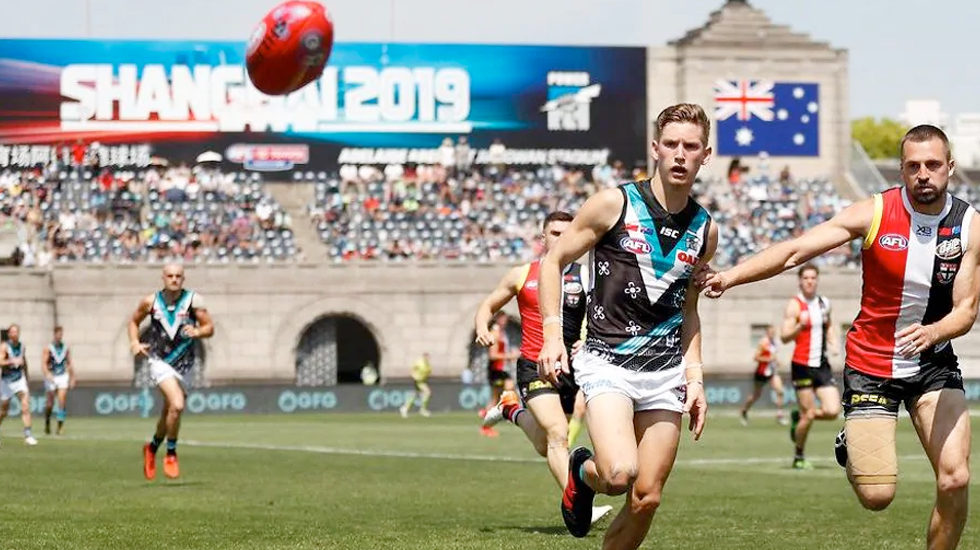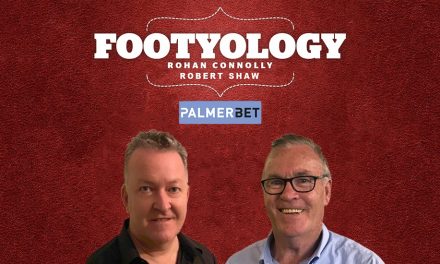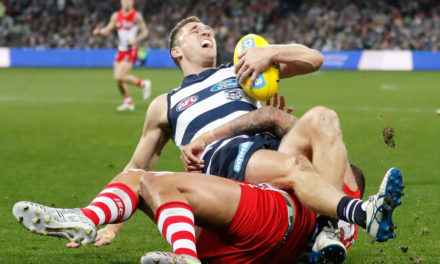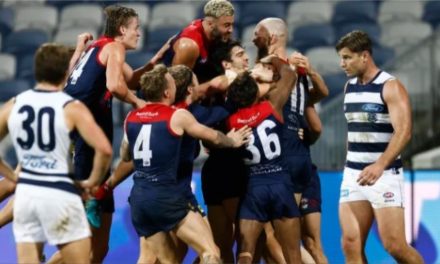Port Adelaide has played three games (so far) at China’s Jiangwan Stadium. Photo: AFL MEDIA.
David Koch in the role of Henry Kissinger, the Nobel Peace Prize winner who opened USA relations with China in the 1970s?
It might just take that for the Port Adelaide Football Club president if his AFL club is to again kick a Sherrin for AFL premiership points at Jiangwan Stadium, Shanghai.
For the second season in succession – after three groundbreaking years in China – Port Adelaide’s international agenda is halted. The COVID pandemic leaves Port Adelaide – and the AFL – hemmed into Australia (and sometimes to limited parts of the island nation when state borders are locked by outbreaks of the virus).
But be it by a vaccine that clears away COVID or any natural mutation of the virus in a repeat of events that ultimately cleared away the Spanish flu epidemic a century ago, the greater threat to Port Adelaide’s “China Strategy” appears in Canberra with the heavy hand of Australian Prime Minister Scott Morrison towards China.
The longer Port Adelaide stays (or is forced out) of China, the less likely – many will eagerly and cynically say – that we will ever again see an AFL home-and-far away game for premiership points played on Jiangwan Stadium.
Future generations of AFL fans and sporting buffs would then be left to raise their eyebrows when someone recalls that AFL games were indeed played in China. There would be a reaction of disbelief in just the same way people respond today when football historians tell the story of New Zealand competing in the Jubilee Australiasian Football Carnival in Melbourne in August 1908.
PLEASE HELP US CONTINUE TO THRIVE BY BECOMING AN OFFICIAL FOOTYOLOGY PATRON. JUST CLICK THIS LINK.
The “greatest game in the world” was – on the 50th anniversary of its start-up in Melbourne in 1858 – spreading its wings before World War I stopped the international growth of Australian football. Now a war of words between Canberra and Beijing could do more damage to a revival of that international dream, more so than COVID.
At least, to deal with any disbelief from future generations, the finer details of Port Adelaide’s grand ambitions in China are now on the public record with former international volleyball player and political adviser Andrew Hunter penning in a book his experiences as the Port Adelaide Football Club general manager (China engagement), a role he commanded from 2015 to last year.
The manuscript also is an enlightening document for those who pick up the dream to take Australian football offshore.
Hunter, now in Perth, left the final chapter until the last minute and well after he had left Port Adelaide telling its board the club had three options once COVID cleared – ranging from continuing with annual games to not. At that stage, the man who wanted to use sport to open diplomacy between Australia and China had not factored in Morrison’s fighting words to China.
Hunter opens his final chapter – The Future – with a quote from former US First Lady Eleanor Roosevelt: “The future belongs to those who believe in the beauty of their dreams.”
The theme might apply to Essendon with its curiosity in India; Greater Western Sydney with its fascination to tap into the Californian economy and Brisbane with its suitors in Singapore.
COVID will test the willingness of many to fulfill the beauty of Australian football – “the greatest game in the world” – by taking it to the world.
No-one will ever question if Koch is a dreamer in this field.
On March 7, 2014 – when Hunter was working for South Australian Premier Jay Weatherill – Koch put up his dream before 400 Port Adelaide fans in the William Magarey Room at Adelaide Oval during the club’s season launch. He was taking Port Adelaide to Macau, China for a pre-season match in 2015.
It became a full-blown AFL premiership match on mainland China in 2017 with the game sealed a year earlier with then Australian Prime Minister Malcolm Turnbull announcing Australian football was taking on a task not even the Americans had nailed with their NFL game, despite having an office in Shanghai.
Morrison is not as reassuring as Turnbull was while Port Adelaide was using a football game in Shanghai to be the setting for many deals that advanced trade, tourism and education links between Australia (in particular Victoria) and China. “Sports diplomacy”, they called it.
Koch’s belief in stronger liaison between Australia and China dates to the late 1970s when his father Dean, while based in the US as an international coal trader, following Kissinger’s footsteps to China. Dean Koch was invited to Beijing to guide the Chinese on mechanical coal mining techniques. He astutely tipped the Chinese would one day establish the world’s biggest economy.
Today, David Koch is not giving up on his China dream. And his vision is far more than just international exposure for Australian football and an AFL premiership match in Shanghai.
“The Port Adelaide Football Club’s China strategy has always been to assist Chinese companies operating in Australia to build networks and connect with the local community through football – and to assist Australian businesses wanting to sell into China to learn about the country and culture and access our business networks to build trade,” Koch told Footyology.
“A physical game was never a cornerstone of our strategy.
“But the Turnbull (federal) government at the time encouraged us to take this next step. The game has become an important marketing tool for our strategy and shows our Chinese partners and the Chinese government that we are serious about the strategy and long term players. It’s a sign of respect.”
Today, the Morrison administration in Canberra appears as much a roadblock to Port Adelaide’s return to Shanghai as the COVID pandemic.
“COVID is definitely the biggest challenge, but the trade war and political tensions aren’t helping,” Koch said.
“The pandemic has played havoc with global sporting events for the past year and for at least another year to come. It’s out of our control and we simply have to follow the advice of the health experts and the government.
“On the political front, China is still Australia’s biggest trading partner. While there is a war of words at the political level, underneath business tries to just get on with things; building and maintaining relationships.
“Business always has to look past the generally short-term political stoushes and focus on the longer term and we’re no different as a football club. We’ve worked hard to build our network in China and learnt a lot. We’re still helping businesses connect and build trade ties.”
Between Port Adelaide’s second match against Gold Coast in Shanghai in 2018 and the first game against St Kilda at Jiangwan Stadium in 2019, Koch revealed the China adventure accounted for 10 per cent of the club’s $60 million annual revenue count – corporate money that would not have been found in Australia.
A critical part of this financial support from China began with the seven-figure cheques from Shanghai real estate tycoon Gui Guojie and his Shanghai CRED empire.
Of the merit of the Chinese financial support of Port Adelaide, Koch says: “Most importantly, it differentiates us from 17 other AFL clubs in the commercial and business sector. We’re seen as innovators, the AFL’s international club which facilitates trade.
“While the game in Shanghai is underwritten, so breaks even financially, the non-game side of the strategy has been building and was becoming a significant revenue stream (before COVID). It has also helped us bring in commercial sponsorship revenue for the traditional domestic part of the organisation.”
Before COVID started changing the world a year ago, Andrew Hunter emphasised how China could help underwrite Port Adelaide’s football objectives by putting his gameplan outside his office at Alberton in December 2019.
“We wanted to push towards a contribution of $3 million to Port Adelaide’s bottom line,” Hunter writes in his book, Port Adelaide to Shanghai – Taking Australia’s game to the world, that will be launched in Adelaide on Friday, February 19 (Wakefield Press, $29.95).
“We wanted to develop long-term, mutually beneficial, generational partnerships. And we wanted to attract global brands, to help (the) Port Adelaide Football Club become a global brand itself.”
Today, Port Adelaide – that in 2011 could not get past the lobby of multinationals to present sponsorship opportunities – has backing from a UK giant (GFG Alliance), a Chinese powerhouse (MG cars) and an American monolith (KFC from Colonel Sanders in the PepsiCo empire).
“At last,” says Hunter, “many fans believed (why Port Adelaide was looking to China) … there was a clear symbol of our success in China.”
Hunter left Port Adelaide last year – deciding to move to Perth before COVID wrecked the AFL presence in Shanghai – noting the China strategy had delivered “real achievements”.
“Hopefully, lasting,” he adds.
There is the big question that has been lingering since 1967 when Harry Beitzel put it all on the line with his dream for Australian football by taking the “Galahs” to Ireland. A year later, Beitzel decided more of the world needed to see the greatest game there was – the 1968 tour started in Bucharest, Romania.
“Guards patrolling the streets at night,” recalls South Australian football great Neil Kerley. “Australian football in Bucharest. Unbelievable.”
Since Beitzel burned $10,000 of his personal wealth in 1968 ($130,000 today) to show the world the grandness of Australia’s game, there have been exhibition matches in England, the USA, Canada, India, Ireland, Dubai and Japan and three AFL premiership matches in Shanghai.
Port Adelaide’s entry to China seemed to finally deliver a genuinely sustainable launch pad for Australian football as an international game.
Why is it that every sport wants to conquer the world while so many in Australian football are scared to go beyond Perth or Cairns?
Port Adelaide captain Tom Jonas says in the foreword to Hunter’s book: “(Port Adelaide when faced with financial disaster in 2011) could easily have re-invented a domestic business strategy, rehashing old plans (such as pokies, pubs and debt-busting rallies) and hoping for the best in a crowded market. Our sponsors could have put their dollars behind sporting teams in tried and tested markets, with significant and stable viewership.
“Our fans could have refused to travel to support the team, reasoning that it was too hard to traverse the globe to watch a game of footy. The players could have shouldered arms, complaining of the inconvenience, the heat, air quality, travel, and the time away from family, when the alternative was to play a simple away fixture in Victoria.
“China isn’t the perfect place to play AFL … however, it’s a worthy challenge and for me it isn’t just about a game of footy. It’s about being part of something much larger. We have the opportunity as a collective to set Port Adelaide up for the long term. We can leave the Port Adelaide Football Club in a better place than we found it.”
A century ago, the folly of World War I stopped Australian football matching rugby for a great rivalry across South Africa, Australia and New Zealand. For much of the past 50 years, the AFL has been challenged to build “Australia’s game” on the national landscape and just as the path to meaningful international exposure began came the mess of COVID … and the political bravado from Canberra.
But if this Australian game is indeed the best in the world, the time has come to believe in that dream … and make it a reality. The final word rests with Koch with his response to the cynics questioning why his AFL club – or any other Australian football team – would take to the world.
“It is no different to why the NFL and NBA plays in the UK and have exhibition matches in Asia; or why the Bolshoi Ballet tours the world,” says Koch.
“Sport and the arts builds goodwill between countries by showcasing their unique culture. AFL is Australia’s indigenous game; it’s unique, it reflects who we are as a community.
“As a result sports diplomacy builds goodwill, shows friendship and opens doors to important political, business and trade networks.”
Kissinger would have made the same point about politics and trade in diplomatic circles 50 years ago.
Michelangelo Rucci was Port Adelaide’s guest to several of the club’s promotional visits to China and covered all three AFL games the club played in Shanghai.












The Saints played Anzac Day games in New Zealand but that fell away, should’ve been maintained.